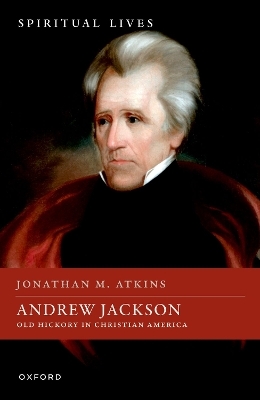
Andrew Jackson
Old Hickory in Christian America
Seiten
2025
Oxford University Press (Verlag)
978-0-19-885235-3 (ISBN)
Oxford University Press (Verlag)
978-0-19-885235-3 (ISBN)
- Noch nicht erschienen (ca. Februar 2025)
- Versandkostenfrei innerhalb Deutschlands
- Auch auf Rechnung
- Verfügbarkeit in der Filiale vor Ort prüfen
- Artikel merken
A short biography of Andrew Jackson (1767-1845), seventh President of the United States (1829-37) and commander of the US forces during the victorious Battle of New Orleans against the British, who was also a slave owner and instigator of the forced removal of native American tribes from their traditional territories.
Few today think of Andrew Jackson, the American military hero and president, as a religious man. Nevertheless, Jackson considered himself a Christian throughout his life. Raised a "rigid presbeterian," Jackson's mother wanted her son to grow up to become a clergyman, and despite suffering tragedies and losing his family in the American Revolution, Jackson never rejected the fundamental Christian teachings of his youth. Although he gained notoriety as a rakish young man, religion's influence on him ebbed and flowed as he established himself as part of the South's planter elite.
With his devout wife, Rachel, he attended church and knew his Bible and religious subjects well, and while his determination to preserve his reputation involved him in numerous personal conflicts--including a duel that led to his killing a rival--he blended the principles of the antebellum South's honor-based culture with his belief in a traditional, orthodox version of Christianity. Likewise, he easily reconciled his religion with his ownership of slaves and his advocacy of Native American removal, and while he equated his enemies with the forces of evil, he always attributed his military and political accomplishments to the blessings of Providence. As he aged, Jackson became more devout, but he never experienced a dramatic conversion--contradicting the expectations of the leading revivalists of his era's Second Great Awakening--and he consistently promoted religious liberty and separation of church and state as core republican principles. Ultimately, Jackson's faith reflected a version of Christianity widespread in his era, and his frequent appeals for divine guidance and for God's blessing on his nation further encouraged the development of an American civil religion.
Few today think of Andrew Jackson, the American military hero and president, as a religious man. Nevertheless, Jackson considered himself a Christian throughout his life. Raised a "rigid presbeterian," Jackson's mother wanted her son to grow up to become a clergyman, and despite suffering tragedies and losing his family in the American Revolution, Jackson never rejected the fundamental Christian teachings of his youth. Although he gained notoriety as a rakish young man, religion's influence on him ebbed and flowed as he established himself as part of the South's planter elite.
With his devout wife, Rachel, he attended church and knew his Bible and religious subjects well, and while his determination to preserve his reputation involved him in numerous personal conflicts--including a duel that led to his killing a rival--he blended the principles of the antebellum South's honor-based culture with his belief in a traditional, orthodox version of Christianity. Likewise, he easily reconciled his religion with his ownership of slaves and his advocacy of Native American removal, and while he equated his enemies with the forces of evil, he always attributed his military and political accomplishments to the blessings of Providence. As he aged, Jackson became more devout, but he never experienced a dramatic conversion--contradicting the expectations of the leading revivalists of his era's Second Great Awakening--and he consistently promoted religious liberty and separation of church and state as core republican principles. Ultimately, Jackson's faith reflected a version of Christianity widespread in his era, and his frequent appeals for divine guidance and for God's blessing on his nation further encouraged the development of an American civil religion.
Jonathan M. Atkins is Professor of History at Berry College in Rome, Georgia, USA, and has published several works on politics and society in the early and antebellum American South. His most notable contributions include Parties, Politics, and the Sectional Conflict in Tennessee, 1832-1861, winner of the 1997 Tennessee History Book Award; an abridged edition of Pauline Wilcox Burke's Emily Donelson of Tennessee (2001); and From Confederation to Nation: The Early American Republic 1789-1848 (2016).
| Erscheint lt. Verlag | 6.2.2025 |
|---|---|
| Reihe/Serie | Spiritual Lives |
| Verlagsort | Oxford |
| Sprache | englisch |
| Maße | 129 x 196 mm |
| Themenwelt | Literatur ► Biografien / Erfahrungsberichte |
| Sachbuch/Ratgeber ► Geschichte / Politik | |
| Geschichte ► Teilgebiete der Geschichte ► Religionsgeschichte | |
| Religion / Theologie ► Christentum ► Kirchengeschichte | |
| ISBN-10 | 0-19-885235-5 / 0198852355 |
| ISBN-13 | 978-0-19-885235-3 / 9780198852353 |
| Zustand | Neuware |
| Informationen gemäß Produktsicherheitsverordnung (GPSR) | |
| Haben Sie eine Frage zum Produkt? |
Mehr entdecken
aus dem Bereich
aus dem Bereich
Von den Anfängen bis zur Gegenwart
Buch | Hardcover (2022)
C.H.Beck (Verlag)
34,00 €
Herkunft, Blüte, Weg nach Osten
Buch | Hardcover (2024)
C.H.Beck (Verlag)
39,00 €


